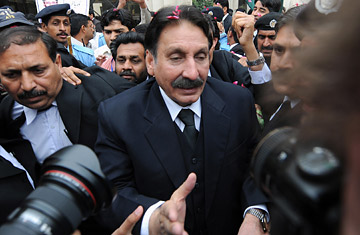
Iftikhar Muhammad Chaudhry arrives at the Supreme Court building in Islamabad.
To his supporters, and there are many, Pakistan's Supreme Court Chief Justice Iftikhar Chaudhry is a hero, a man of honor who stood up for an independent judiciary and defied the diktats of former President Pervez Musharraf — and who continues to hold the political establishment accountable. To his detractors, however, Chaudhry is an activist jurist with unbridled powers, a populist with grandiose political ambitions.
In a country where politics can get very personal, the Chief Justice's relationships with the pillars of civilian and military power, President Asif Ali Zardari and Army Chief of Staff General Ashfaq Kayani respectively, could be important in shaping Pakistan's transition from de facto military rule to civilian democracy.
And those relationships are likely to be tested in the tussle over a package of wide-ranging constitutional reforms that was due to be introduced to parliament on Friday, whose purpose is to reverse changes made by previous military rulers, trim the power of the presidency, and alter the procedure for Supreme Court appointments. The bill would take Supreme Court appointments out of the hands of the president, who now makes nominations after consulting with the chief justice, and place them before a government legal committee that also includes several justices. Unlike the present system, judges would have to be confirmed by a parliamentary vote.
The proposed reforms have widened the rift between Chaudhry and the government that has grown since the Chief Justice last year struck down amnesty decrees by Musharraf that protected many senior figures in government — including Zardari himself once out of office — from prosecution on corruption charges. And some saw the Chief Justice's hand in the eleventh-hour stalling of parliamentary debate on the package on Friday by opposition leader Nawaz Sharif, who objected to proposals on the selection of judges. Sharif's opposition, some senior politicians suggest, results from being pressured by Chaudhry, who is allegedly opposed to having his own power in the selection of judges curtailed. "The chief justice threatened [Sharif]. He said he'd open up all cases against him," a senior leader of the ruling Pakistan People's Party said on condition of anonymity. "He's become an absolute dictator."
On the contrary, says a legal expert at the Supreme Court and Chaudhry associate speaking on condition of anonymity, the conflict is caused by the "government [wanting] a chief justice and court which is compliant, not independent."
The standoff over how judges are selected could have far-reaching implications in a political order feeling its way towards democracy, with the different branches of government are "attempting to first stretch the bounds of their authority and second, to learn how to work with each other," says Samina Ahmed, Pakistan director for the International Crisis Group, a global policy-research center. "The problem in Pakistan has [historically] been with the military's intervention, transitions have been disrupted, and the judiciary in the past has supported every military intervention."
But as the two civilian branches of government tussle over their powers, neither appears to have clear backing from the military, whose preferences are often decisive. Still, some Pakistani media commentators suggest that the generals may be colluding with the judges to limit the power of government, already groaning under the weight of the president's sagging popularity. They point to a stalled but soon-to-be-reopened Supreme Court case that accuses intelligence agencies of using the "war on terror" as a pretext to secretly detain thousands of citizens suspected of links to Baluchi separatists and other radical groups. The local Dawn newspaper reported last month that Supreme Court Justice Javed Iqbal said that the court "would not like to create the impression that it was out to destroy or tarnish the image of intelligence agencies" with regard to these cases.
Chaudhry had in 2007 begun to investigate the issue of Pakistanis alleged to have disappeared into secret custody before he was deposed by Musharraf, and had ordered members of the security forces to produce several of the missing in court. Now, some media commentators are suggesting that Chaudhry is retreating from that fight. Chaudhry's supporters deny the claim, and say that the court will not shy away from prosecuting any security officials who have broken the law.
Whatever the outcome of the particular battles over constitutional powers and various court cases, what remains clear is that Justice Chaudhry, while holding an office that is ostensibly above politics, will remain in the thick of it.
